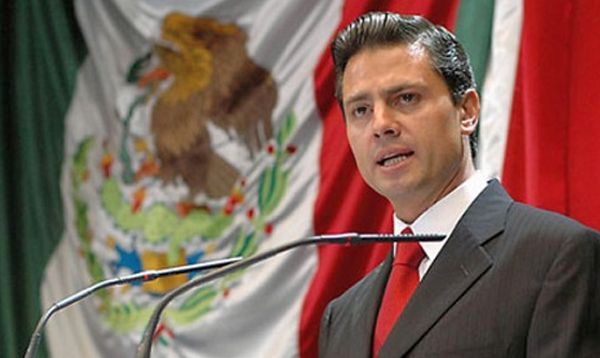Mexico City, Mexico - Mexican President Enrique Pena Nieto said he’s negotiating support to break the state monopoly over oil and gas exploration and production this year to accelerate economic growth. The peso pared its loss.
In the model envisioned by Pena Nieto, state-owned Petroleos Mexicanos (Pemex) would develop certain fields, with others being tapped by foreign and private companies. He declined to discuss details of the intended proposal, or whether it would require a change in the constitution.
Seven decades after his party seized fields from the predecessors to Exxon Mobil Corp. and Royal Dutch Shell Plc, Pena Nieto is preparing for the return of international oil companies to arrest eight years of decline in crude output. An opening would probably be broad, from offshore drilling to shale fields similar to those that have revived the US petroleum industry, Pena Nieto said.
"It’s obvious that Pemex doesn’t have the financial capacity to be in every single front of energy generation," the 46-year-old president said in an interview. "Shale is one of the areas where there’s room for private companies, but not the only one."
Skeptical Investors
Pena Nieto said his administration will send the energy bill to congress by September, when regular sessions resume, along with a tax proposal. He said he’s confident the so-called Pact for Mexico of the country’s top three political parties will ensure the bill is approved by Congress before year end.
Mexico is seeking to attract capital for deep-water and shale deposits found in the past decade as reserves dwindle in Cantarell, the 1976 oil discovery that ranked among the world’s largest.
Still, investors became more skeptical about the depth of the energy reform after it wasn’t included in the schedule for special congressional sessions in July and August, saving it for the final four months of the year along with a crowded agenda that includes the tax overhaul and next year’s budget.
‘Good Path’
 |
President Pena Nieto’s comments boosted confidence he’ll make good on his pledge to open the state-controlled energy industry, said Ramon Cordova, a currency trader at Banco Base SA.
"What the market wants is the reforms to pass," Cordova said by phone from San Pedro Garza Garcia, Mexico. The comments "discuss that the energy reform is on a good path and it gives some more information, because up until now it’s been very opaque as to what are the actual points that the reform will encompass."
Opening oil and gas exploration for private investment will help Mexico revive oil production that is heading for its ninth year of decline. Crude output averaged 2.52 million barrels a day through June 9th, compared with 3.38 million barrels a day in 2004.
"We’re approaching key deadlines," Pena Nieto said. "I’m optimistic that this political climate of understanding and agreement will be maintained."
‘Signature Issue’
Pena Nieto said there’s political momentum to pass more reforms after the approval of sweeping education and telecommunications laws and the creation of the Pact for Mexico. His Institutional Revolutionary Party dropped opposition to an oil-law overhaul in March.
Opening Pemex to more private investment would be the "signature issue" for judging his presidency, Pena Nieto said during the campaign.
Pemex bondholders are losing confidence in his ability to achieve the needed changes after the Pact for Mexico alliance he engineered between his own Institutional Revolutionary Party, the National Action Party of predecessor Felipe Calderon, and the Democratic Revolution Party showed signs of fraying.
"If the Pacto por Mexico dies, then what’s the plan?" Duncan Wood, director of the Mexico Institute at the Woodrow Wilson International Center for Scholars in Washington, said in an interview on June 13th. "We don’t know what the plan is after that."
Social Programs
There’s concern that delays in introducing an energy bill could threaten its depth and support, said Jeremy Martin, an oil specialist at the Institute of the Americas in California.
The longer things go, people start taking different directions, and then politicians, his team, start finding reasons why they shouldn’t do something big," Martin said in a telephone interview on June 14th.
Pena Nieto’s energy and tax pledges, and his early legislative success, helped attract overseas asset managers including Pacific Investment Management Co., the world’s biggest bond fund, and lift foreign holdings of peso bonds to record levels. Yields on government peso debt due in 2024 dropped to a record low and the currency climbed to the strongest level in almost two years against the dollar last month. Yields have since climbed and the currency weakened on the prospect that the Federal Reserve will scale back unprecedented stimulus.
"Overall he’s done an excellent job in his first six months in office," James R. Jones, the US ambassador to Mexico when the North American Free Trade Agreement took effect in 1994, said in a telephone interview from Washington on June 14th. "He has the best political sensitivity and touch I’ve seen since President Salinas was able to marshal various factions of Mexico to pass NAFTA."


